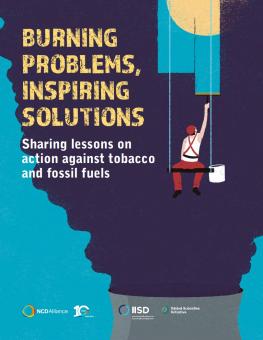
Burning Problems, Inspiring Solutions: Sharing lessons on action against tobacco and fossil fuels
This report seeks to drive action on air pollution and climate change through the regulation of fossil fuels, considering society's experience with tobacco control.
Key Messages
The report looks at different measures that have been used to address tobacco use, fossil fuel combustion and climate change, and concludes with a series of recommendations to support action against air pollution and climate change, including:
- Naming and addressing fossil fuels as the root cause of the problem, as was done with tobacco. This also involves raising awareness of the negative health effects (beyond the environmental ones), both locally and globally, of the burning of fossil fuels.
- Implementing government measures to regulate and curb the production and use of fossil fuels through the many instruments available, such as getting market prices right through subsidy reform, taxation measures and the introduction of measures banning the specific production and consumption of certain products.
- Defining adequate, fair and just transition plans away from unhealthy commodities, recognizing the needs of those groups dependent on oil, gas and coal, whether they be consumers or employees.
Fossil fuel combustion is a major source of toxic air pollution that kills 7 million people every year, almost the same number of deaths caused by tobacco smoking. Burning fossil fuels releases a series of gases and tiny particles that have noxious effects for human health, leading to several respiratory and cardiovascular diseases and cancer.
This report searches to drive action on air pollution and climate change through the regulation of fossil fuels, considering the experience with tobacco control.
The report has been prepared for health care and environmental audiences, including policy-makers, NGOs and academics. It discusses local, national and international measures that can be employed to restrict the production and use of tobacco, on the one hand, and fossil fuels, on the other. Its objective is to facilitate a common language and vision by sharing similarities between tobacco control, air quality improvement and climate change mitigation.
Participating experts
You might also be interested in
At long last, Canada restricts oil and gas subsidies (except for all the loopholes)
Environment and Climate Minister Steven Guilbeault has unveiled detailed plans to phase out "inefficient" oil and gas subsidies, based on guidelines released yesterday morning that take effect immediately and are meant to fulfill a 14-year-old pledge by G20 countries.
Heatwaves to hit China once every 5 years as global extreme weather events multiply, study finds
Record-breaking heatwaves that have scorched North America, Europe and China are set to worsen in future unless the world stops burning fossil fuels, according to a study by the World Weather Attribution (WWA) academic initiative.
Canada to Cut Oil & Gas Subsidies
The Canadian federal government has implemented a framework to revoke subsidies for fossil fuels that are deemed inefficient. However, the framework lacks details on the specific subsidies to be eliminated and does not provide a dollar amount for the cuts. Canada, as the fourth-largest oil producer in the world, is the first country to comply with a 2009 pledge made by the Group of Twenty (G20) nations. The government plans to exempt oil and gas projects that have plans to reduce emissions and utilize carbon capture and storage (CCS) technology. Federal Environment Minister Steven Guilbeault stated that the objective is for federal support to be directed only towards projects that decarbonize the sector and result in significant greenhouse gas emissions reductions.
Canada Bans Some Fossil Fuel Subsidies, Meeting Decade-Old G-20 Pledge
Canada revealed new rules to ban some fossil fuel subsidies, targeting those that unfairly advantage oil and gas, solely support sector activities or endorse consumption of fuels that worsen climate change.